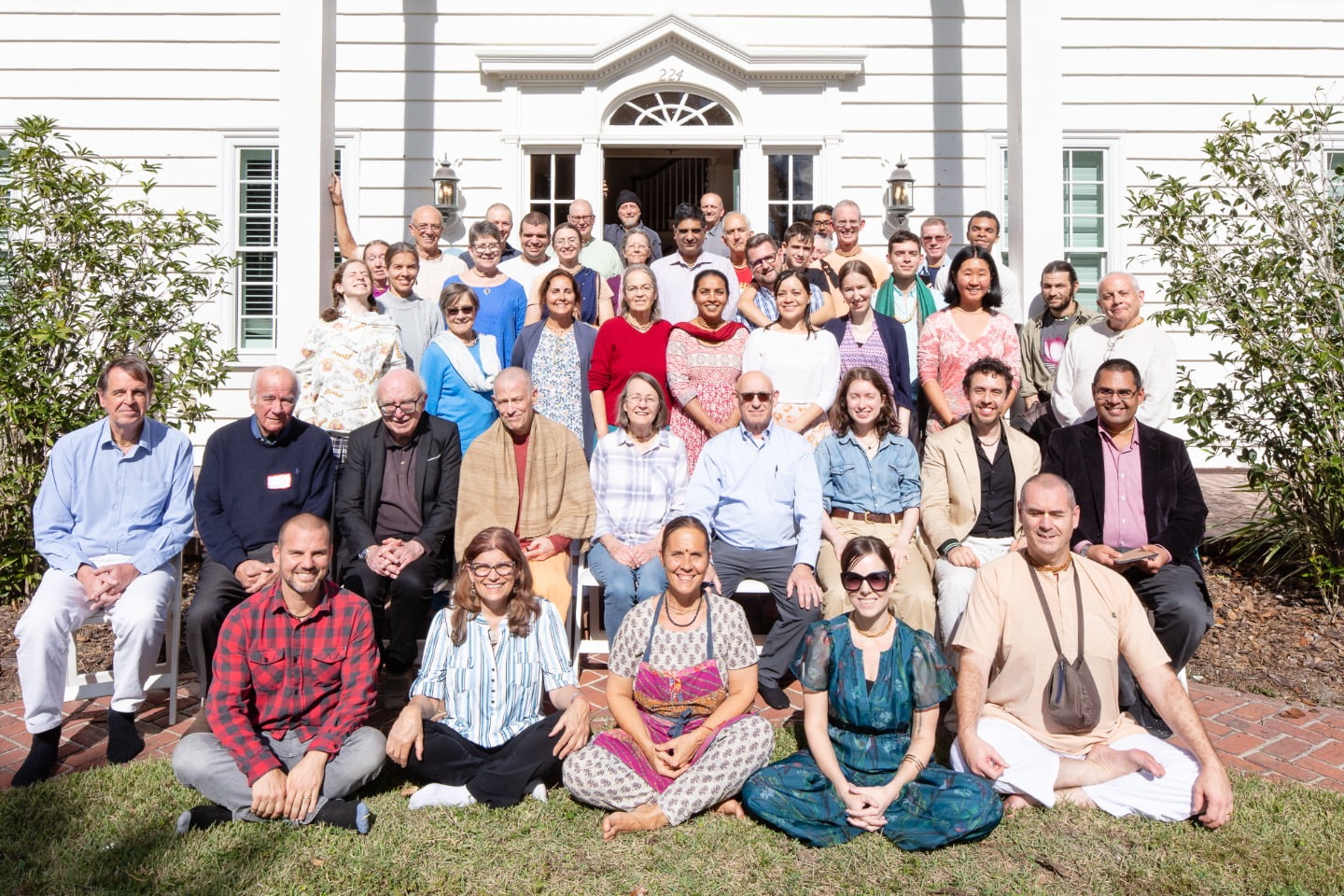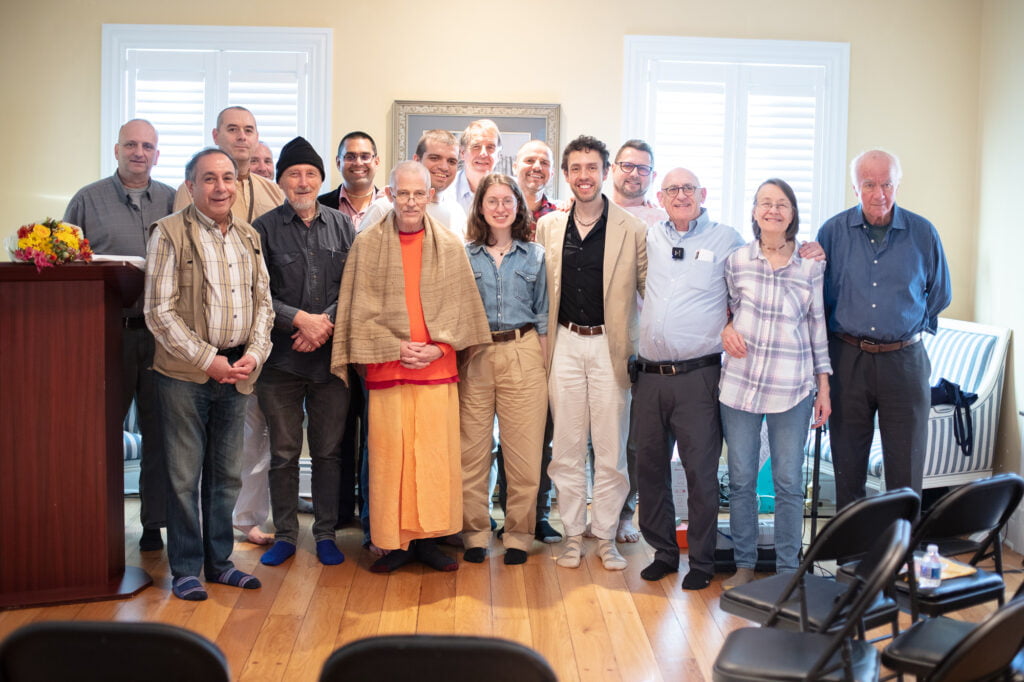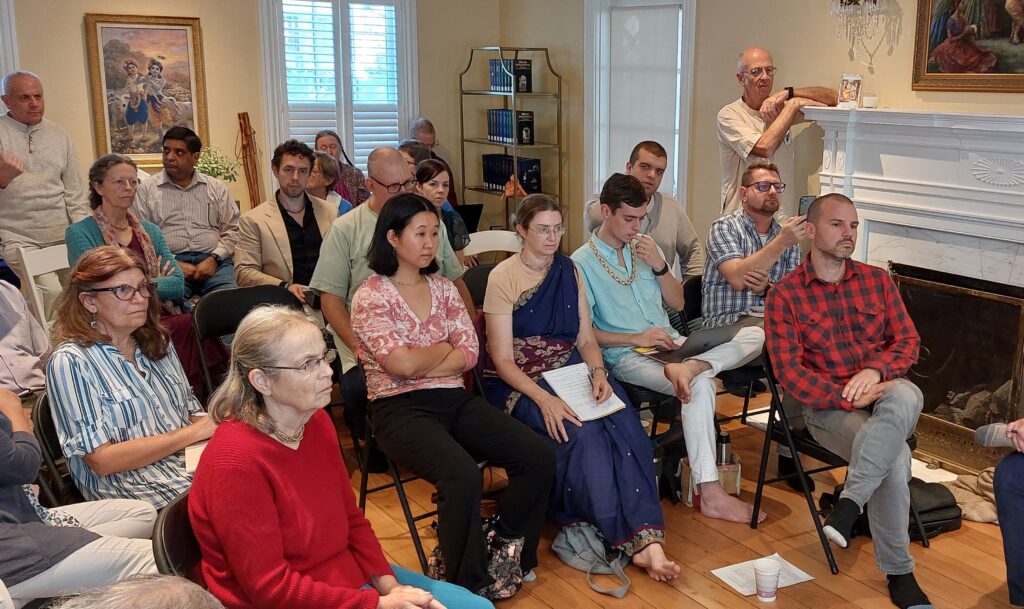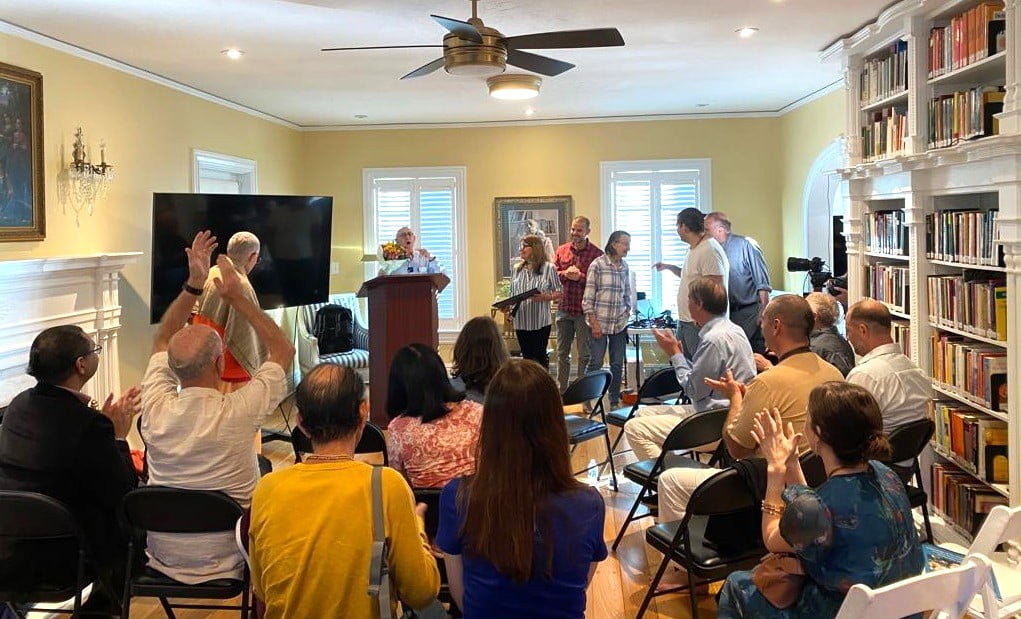Scholars Gather for 2023 BIHS Cosmology Conference
By Prishni Sutton | Nov 30, 2023

2023 Conference participants in front of the BIHS Headquarters.
The Bhaktivedanta Institute for Higher Studies (BIHS) hosted its second international conference, “Cosmology of the Bhagavata Purana: Current Research on History, Philosophy, and Science,” on November 17–19 at the BIHS Headquarters in Gainesville, FL. Use of this lovely facility, the former home of the president of the University of Florida, was secured with the generous support of Hridayananda Das Goswami.
This conference was a natural outgrowth of three prior BIHS cosmology workshops (see BIHS events page), which examined traditional and contemporary studies of cosmological issues in relation to Sanskrit texts such as the Puranas (notably Srimad-Bhagavatam), the Jyotiṣa Sastras, and the Mahabharata. Earlier in November, the BIHS also facilitated workshops chaired by Akhandadhi Das relating to exhibits to be housed in the west wing of the Temple of the Vedic Planetarium in Mayapur, West Bengal. Such workshops have inspired publications that feature the recent work of scholars associated with these projects, including the journal Purva-paksa: Fine-Tuning Opposing Views, Volumes I and II (forthcoming) and Vedic Cosmography in a Modern Context: Virodha-parihāra Revisited
Scholars from around the world joined together in person and on Zoom to discuss academic analyses in discourse with internal cultural appreciations and to network with established scholars familiar with Puranic and other ancient and modern cosmological constructs. The event opened on a Friday evening with a premiere viewing of the documentary video: “Exploring the Puranic Vision of the Universe: The Work of the BIHS,” by Richard Cole (Radha Mohan Das). This film summarized cosmology research that has been presented at BIHS seminars, thus bringing the participants up to date on the conference topic.

BIHS Conference speakers.
Highlights of the Saturday and Sunday talks include:
SESSION 1. Philosophy of cosmology in relation to the Purāṇic tradition.
The first session addressed several fundamental concerns: seeking parallels with current thinking and descriptions of the Puranic universe, exploring the limitations of modern cosmological approaches, and most importantly, defining the role of consciousness in our attempts to understand the world around us.
Day 1 began with “Cosmogony: Ingredients for Making a Successful Universe” by Akhandadhi Das (Martin Fleming – BIHS and MoVP Board member), which explored possible states and conditions that might have existed prior to the Big Bang as “universal seeds.” The conference chair, Doug Watson (Ph.D. in Physics), offered conscious agency as the missing ingredient in the recipe for manifesting the cosmos in his presentation, “The Flow of Causality Before the Big Bang.” Our youngest participant, Gopal Goel (a third-year MIT Math and Physics major), discussed “The Amplituhedron: A Potential Framework for the Emergent Nature of Spacetime,” which questioned the fundamental nature of spacetime.
Laura Domenech (postgraduate student in Theoretical Physics), Tiziano Valentinuzzi (Giridhari – PhD Astronomy), Jack Dodson (Kala-Svarupa – MS in Mathematical Science and in Particle Physics), and Mauricio Garrido (Murli Gopal – PhD in Physics) rounded out the session by challenging current worldviews concerning the basic principles underlying the creation of the universe.
SESSION 2. Archeoastronomy and Purāṇic chronology.
The field of archeoastronomy is currently gaining recognition as an interdisciplinary science alongside architecture, archaeology, and astronomy. Michael Cremo (Drutakarma – the “forbidden archeologist”) opened the session with “Exoarcheology and Archeoastronomy: Possibilities for Vedic Cosmology Research,” suggesting that by “heading into the future, we may arrive in the past.” This was followed by “The Size and the Age of the Universe” by Yanying Wang (Nandimukhi – PhD in Statistical Science), which proposed “distinction(s) between the universe… of telescopes and computers and the one described in Srimad-Bhagavatam.” Two Russian scholars, Yuriy N. Moskalev (Yogipriya – PhD in Economics) and Alexey Timoschuk (Abhinanda – PhD in Philosophy), joined via Zoom to discuss “Cycles of Indian Cosmology and Economic Modeling.” New research concerning “Srimad-Bhagavatam as a Late Neolithic / Early Metal Age Text” was presented by Christopher J. Hayton (Krsna-bhajana – Ph.D. in Social Work).
SESSION 3. Purāṇic and Siddhāntic cosmology – contemporary scholarship
Saturday’s final session packed in eight talks that continued the three prior cosmology workshop themes. “What is the Brahmanda?” by Ukrainian BIHS researcher Vasyl Semenov (Dvija Govinda – Ph.D. in Acoustics and Computational Mathematics) set the scene for further discussions by highlighting the unique themes and images reflecting “different astronomical and cosmological aspects of reality latent in the term brahmanḍa.” Independent scholar W. Randolph (Randy) Kloetzli (Ph.D. in History of Religions) offered new perspectives on modeling the cosmic plane, Bhu-mandala, in his talk on “The Puranic Cosmograph: Projection of the Sphere of the Heavens.” And professional astrologer Vic DiCara (Vraja Kisora – author) emphasized the rationality behind the poetry of Fifth Canto descriptions by presenting “Astronomy in the Bhagavatam as ‘Normal’.”
Other talks by Silvia Friedrich (Sriji – MS in Geology), Christopher J. Hayton (Krsna-bhajana – Ph.D. in Social Work), and Prishni Sutton (BIHS and RLTA Board member) added new details to the rapidly expanding BIHS Vedic cosmology research archives. The 2022 Mumbai “International Conference of Puranic & Siddhantic Cosmology” was expertly outlined in a report recorded for presentation in this session by Pandu Santhoju (Pavaneshwar – MS Electrical Engineering), one of the main organizers of that event.

Conference attendees listen to a lecture by Radhika Raman Das entitled “Can Empirical Observation Influence Scriptural Testimony?”
SESSIONS 4 & 5. Understanding science in śāstra: Hermeneutics and Epistemology
Sunday was dedicated to unpacking the complex and often controversial issues surrounding the Fifth Canto’s apparent correlations and conflicts with the worldview of modern scientists. The Charles Redd Endowed Professor of Religious Studies and Department Head of History at Utah State University, Ravi M. Gupta (Radhika Ramana Das – D.Phil. in Hinduism), opened the morning session with “Can Empirical Observation Influence Scriptural Testimony? An Exploration through Jīva Gosvami’s Sarva-samvadini.” His carefully crafted philosophical reasoning created “space for empirical knowledge to coexist with scriptural testimony, and, to a limited extent, influence how we interpret scripture.”
The second talk, “‘The Map is Not the Territory’: Mapping Hermeneutic Approaches to the Bhagavatam‘s Cosmologies,” by Oxford scholar Kenneth Valpey (Krishna Kshetra Swami – D.Phil. in Theology), developed dialogical themes providing “possible hermeneutic approaches that could serve to bring the cosmological accounts in the Bhagavatam into conversation with contemporary scientific cosmological accounts.” Alexey Timoschuk (Abhinanda – Ph.D. in Philosophy) praised Richard L. Thompson’s (Sadāpūta’s) scholarly background and uncommon analytical talents in his comparative analysis titled “Vedic or Scientific? Correlation of Worldviews in Bhaktivedanta Institute.” “Purva-paksa as a Contemporary Hermeneutical Exercise” by S. E. Kreitzer (Sthita-dhi-muni – Ph.D. in History of Science) illustrated “how ideals associated with the Sanskrit term purva-paksa remain relevant in our own times.”
The six afternoon talks were given by accomplished Vaishnava scholars whose research is grounded in the humanities: Dmitriy Popov (Damodar Pandit – Ph.D. in Philosophy), István Tasi (Ishvara Krishna – Ph.D. in History), Gergő Péter Rátkai (Gaurasundara Krpamaya – Ph.D. in Historiography), Ganesh Swaminathan (IVS Master’s program), Jonathan Edelmann (Janakirama – Ph.D. Religious Studies and Theology), and Krishna Abhishek Ghosh (Ph.D. in South Asian Languages and Civilizations). Please see the abstract section towards the back of the Conference brochure for more information concerning these important presentations.
Both the morning and afternoon sessions were followed by lively Round Table discussions, which churned the ideas, inviting a modern “purva-paksa,” where scholarly analysis from different perspectives opened the presentations from all sessions to the test of critical examination in a manner that stimulates productive scholarly discourse.

Brahma Tirtha Das, the Executive Director of the Bhaktivedanta Institute for Higher Studies, offers a note of thanks at the end of the Conference.
The BIHS Headquarters was packed with more than 50 in-person participants, and remote attendance via Zoom brought in another 100 attendees from around the world. Spirited Round Table discussions and vibrant lunch and dinner conversations demonstrated the value of bringing intellectuals and scholars together in an organized forum (sadhu sanga). As one of the conference presenters, Radha Mohan, said, “I considered it a great privilege to be invited to participate and contribute to the conference. The subjects were broad yet simultaneously highly focused. To me, it confirmed my understanding that profound knowledge of astronomy and cosmography is encoded within the Srimad-Bhagavatam and other ancient Puranas. The hospitality I experienced at the conference was second to none. It was a great opportunity to associate with devotees and well-wishers with similar interests.”
The BIHS hopes to include such global gatherings as a regular feature of their outreach efforts. To learn more about BIHS, upcoming events, and publications, please visit their website.














